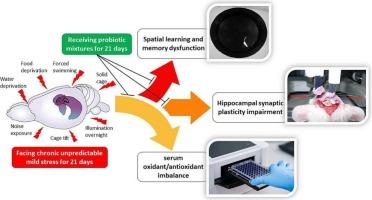应激下海马体的认知和突触可塑性对不同益生菌混合物的反应相似。
IF 2.6
4区 医学
Q3 NEUROSCIENCES
引用次数: 0
摘要
已经证明,当压力源改变肠道微生物的数量和质量时,益生菌修复肠道菌群。在慢性不可预测轻度应激(CUMS)大鼠模型中,我们评估了不同益生菌混合物对认知功能、突触可塑性和一些生化因子的影响。动物组包括对照大鼠(CON)、CUMS暴露大鼠(STS)和三组不同益生菌方案的应激动物。评估认知行为、海马突触可塑性和血清氧化/抗氧化因子。虽然CUMS破坏了空间学习和记忆,但益生菌管理改善了行为功能。对照组的老鼠表现出强大的可塑性,而STS的老鼠则没有。益生菌恢复了应激组突触的可塑性。CUMS还导致抗氧化剂减少和氧化剂增加,但益生菌治疗改善了这些变化。似乎各种益生菌鸡尾酒对海马体依赖性认知和突触可塑性以及氧化/抗氧化因子具有相似的影响。本文章由计算机程序翻译,如有差异,请以英文原文为准。

Cognitive function and synaptic plasticity in the hippocampus exposed to stress respond similarly to different probiotic mixtures
It has been proven that while stressors change the quantity and quality of gut microbes, probiotic bacteria repair the intestinal flora. We evaluated the effect of different probiotic mixtures on cognitive function, synaptic plasticity, and some biochemical factors in a rat model of chronic unpredictable mild stress (CUMS). Animal groups included the control rats (CON), rats exposed to CUMS (STS), and three groups of stressed animals with different probiotic regimens. Cognitive behavior, hippocampal synaptic plasticity, and serum oxidant/antioxidant factors were evaluated. Whereas the CUMS disrupted the spatial learning and memory, the probiotic administration improved behavioral functions. While the CON rats displayed a robust plasticity, their STS counterparts did not. The probiotics restored the synaptic plasticity in all stressed groups. CUMS also led to a decrease in antioxidants and an increase in oxidants, but probiotic treatment improved these changes. It appears that the various probiotic cocktails have a similar effect on hippocampus-dependent cognition and synaptic plasticity, as well as on oxidant/antioxidant factors.
求助全文
通过发布文献求助,成功后即可免费获取论文全文。
去求助
来源期刊

Brain Research
医学-神经科学
CiteScore
5.90
自引率
3.40%
发文量
268
审稿时长
47 days
期刊介绍:
An international multidisciplinary journal devoted to fundamental research in the brain sciences.
Brain Research publishes papers reporting interdisciplinary investigations of nervous system structure and function that are of general interest to the international community of neuroscientists. As is evident from the journals name, its scope is broad, ranging from cellular and molecular studies through systems neuroscience, cognition and disease. Invited reviews are also published; suggestions for and inquiries about potential reviews are welcomed.
With the appearance of the final issue of the 2011 subscription, Vol. 67/1-2 (24 June 2011), Brain Research Reviews has ceased publication as a distinct journal separate from Brain Research. Review articles accepted for Brain Research are now published in that journal.
 求助内容:
求助内容: 应助结果提醒方式:
应助结果提醒方式:


